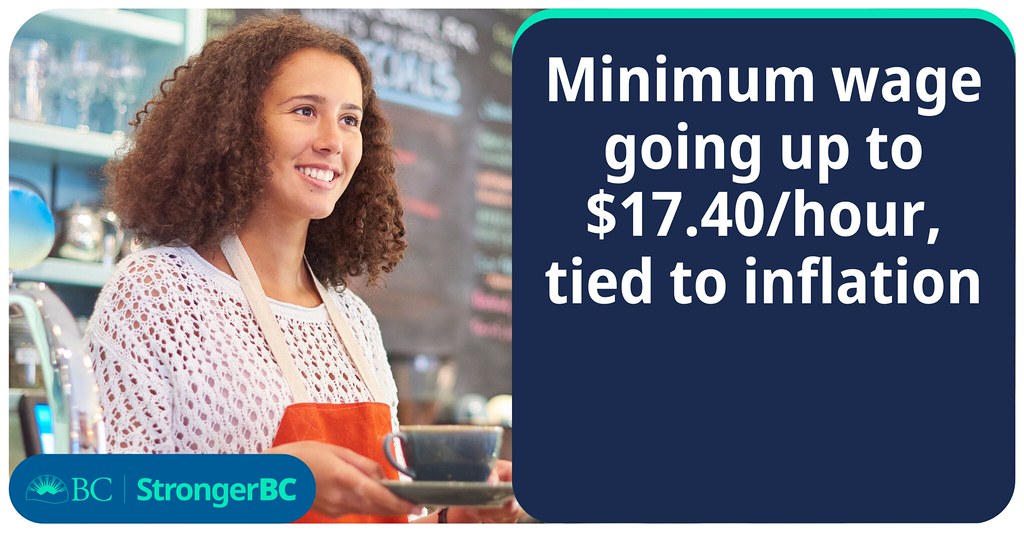BC is raising the minimum wage again with the lowest-paid workers tol get a pay raise from $16.75 to $17.40 per hour on June 1, 2024. This represents a 3.9% increase, consistent with B.C.’s average rate of inflation in 2023. “B.C. has gone from having one of the lowest minimum wages in the country to the highest of all the provinces. We made a commitment to tie minimum-wage increases to the rate of inflation to prevent B.C.’s lowest-paid workers from falling behind,” said Harry Bains, Minister of Labour. “And today, we are enshrining that commitment into law.”
By DESIBUZZCanada Staff
VICTORIA – BC is raising the minimum wage again with the lowest-paid workers tol get a pay raise from $16.75 to $17.40 per hour on June 1, 2024.
This represents a 3.9% increase, consistent with B.C.’s average rate of inflation in 2023.
The alternate minimum rates, for residential caretakers, live-in home-support workers and camp leaders, will receive the same 3.9% increase on June 1. On Dec. 31, 2024, the minimum piece rates for 15 hand-harvested crops will also increase by the same percentage.
“B.C. has gone from having one of the lowest minimum wages in the country to the highest of all the provinces. We made a commitment to tie minimum-wage increases to the rate of inflation to prevent B.C.’s lowest-paid workers from falling behind,” said Harry Bains, Minister of Labour. “And today, we are enshrining that commitment into law.”

With the amendments in Bill 2, future increases to all minimum rates will be automatically determined by the previous year’s average inflation rate for B.C. This will provide certainty and predictability for workers and employers. Minimum-wage earners will be able to count on increases every year.
Most wage rates will increase on June 1 of each year, except for agricultural piece rates that will increase on Dec. 31 of each year to ensure crop producers will not have to adjust wages in the middle of the harvesting season.
“As a fast-food worker earning minimum wage, I welcome the government’s rule to increase wages with inflation annually, providing much-needed financial stability to cope with the rising cost of living,” said Carmen Velasco in Richmond.

The changes align with government priorities to help lift more people out of poverty, make life more affordable and build a strong and fair economy for B.C.
Quick Facts:
* In 2023, B.C. increased the minimum wage by 6.9%, which was the increase in the cost of living in the province in 2022.
* At least eight other Canadian jurisdictions also base their minimum-wage increases on annual changes to the rate of inflation determined by the Consumer Price Index.
What to know about British Columbia’s minimum wages since 2001
* 2001: $8
* 2002: no increase
* 2003: no increase
* 2004: no increase
* 2005: no increase
* 2006: no increase
* 2007: no increase
* 2008: no increase
* 2009: no increase
* 2010: no increase
* 2011: $8.75, then $9.50
* 2012: $10.25
* 2013: no increase
* 2014: no increase
* 2015: $10.45
* 2016: $10.85
* 2017: $11.35
* 2018: $12.65
* 2019: $13.85
* 2020: $14.60
* 2021: $15.20
* 2022: $15.65
* 2023: $16.75
* June 1, 2024: $17.40
















10 Comments
Открыть учетную запись в binance
9 months agoCan you be more specific about the content of your article? After reading it, I still have some doubts. Hope you can help me.
J88
1 month agoĐến với J88, bạn sẽ được trải nghiệm dịch vụ cá cược chuyên nghiệp cùng hàng ngàn sự kiện khuyến mãi độc quyền.
GO88
1 month agoTham gia cộng đồng game thủ tại Go88 để trải nghiệm các trò chơi bài, poker phổ biến nhất hiện nay.
GO88
1 month agoTham gia cộng đồng game thủ tại Go88 để trải nghiệm các trò chơi bài, poker phổ biến nhất hiện nay.
MM88
4 weeks agoVới giao diện mượt mà và ưu đãi hấp dẫn, MM88 là lựa chọn lý tưởng cho các tín đồ giải trí trực tuyến.
GO88
4 weeks agoTham gia cộng đồng game thủ tại Go88 để trải nghiệm các trò chơi bài, poker phổ biến nhất hiện nay.
MM88
3 weeks agoVới giao diện mượt mà và ưu đãi hấp dẫn, MM88 là lựa chọn lý tưởng cho các tín đồ giải trí trực tuyến.
GO88
3 weeks agoTham gia cộng đồng game thủ tại Go88 để trải nghiệm các trò chơi bài, poker phổ biến nhất hiện nay.
J88
2 weeks agoĐến với J88, bạn sẽ được trải nghiệm dịch vụ cá cược chuyên nghiệp cùng hàng ngàn sự kiện khuyến mãi độc quyền.
betano casino test
8 hours agoTatsächlich stellte sich heraus, dass Anbieter mit deutscher Lizenz fortan an derartig strenge Einschränkungen und Verbote gebunden sind,
dass anspruchsvolle Spieler die Freude am Glücksspiel verlieren. Casinos mit deutscher Lizenz, wie Wunderino oder DrückGlück, erfreuten sich über viele Jahre hinweg großer Beliebtheit.
Neuer Anbieter ohne deutsche Regeln Etablierter Anbieter ohne deutsche Regeln Und welche Casinos ohne deutsche Lizenz sind besonders empfehlenswert?
Viele Casinos ohne Lizenz überraschen außerdem mit wöchentlichen Free Spins oder Cashback-Aktionen, die deutschen Spielern normalerweise gar
nicht zugänglich wären. Internationale Anbieter können Bonusaktionen anbieten, die deutsche Plattformen gar nicht umsetzen dürfen. Statt starren Regeln erwarten euch großzügige Boni,
schnelle Auszahlungen und eine Spielauswahl, die weit über das hinausgeht, was deutsche
Anbieter bieten dürfen. Unsere Tests haben gezeigt, dass es deutliche
Unterschiede zwischen deutschen Anbietern und Casinos ohne Lizenz gibt.
Im Automaten-Segment kommt gibt’s in den deutschen Casinos ebenfalls eine sehr wesentliche
Einschränkung. Ein Punkt bleibt aber bestehen, mehr als Online Slots gibt’s in den deutschen Casinos nicht.
Wir gehen davon aus, dass sich die Spielauswahl der deutschen Anbieter in kommenden Monaten deutlich verbessert.
References:
https://online-spielhallen.de/die-kingmaker-casino-mobile-app-ihr-konigliches-spielvergnugen-fur-unterwegs/